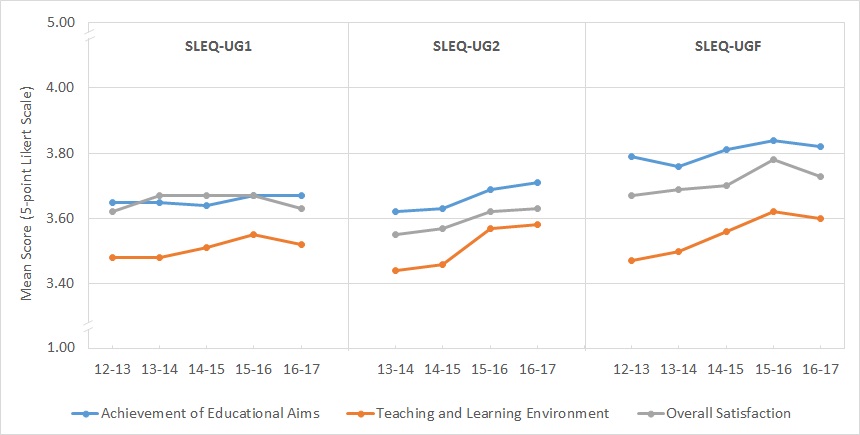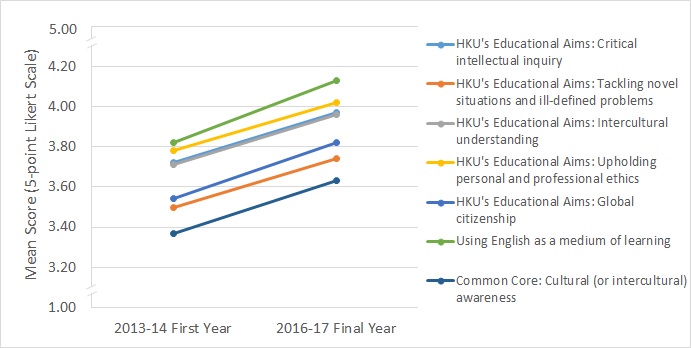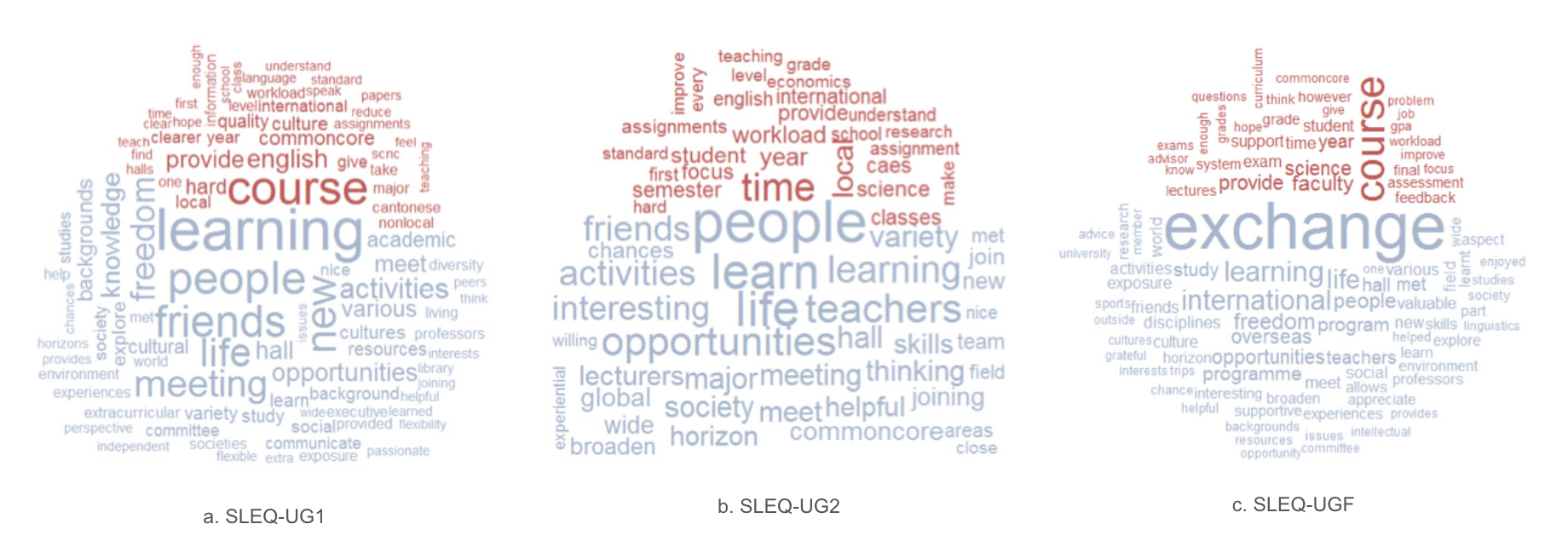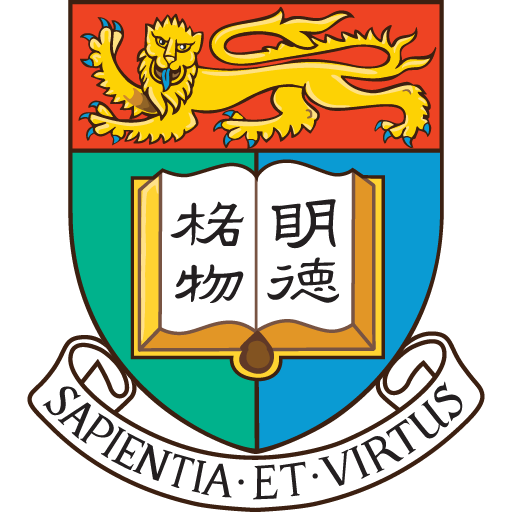2023-24
Highlights
- Positive patterns were maintained over the years of SLEQ-UG administration from the perspectives of first, second, and final year students regarding Attainment of University Educational Aims, Teaching and Learning Environment, and Overall Satisfaction (Figure 1).
- Notable gains in Attainment of University Educational Aims were found through the longitudinal tracking of students who completed the SLEQ-UG in both their first and final years (Figure 2).
- Final-year respondents, continuing the upward pattern from previous years, consistently reported over 80% agreement on their Interdisciplinary Learning Experience and Innovative Learning Experience throughout their university studies.
- Undergraduate students highlighted keywords such as “friend”, “different”, and “opportunity” as the best aspects of their university experience. (Figures 3).

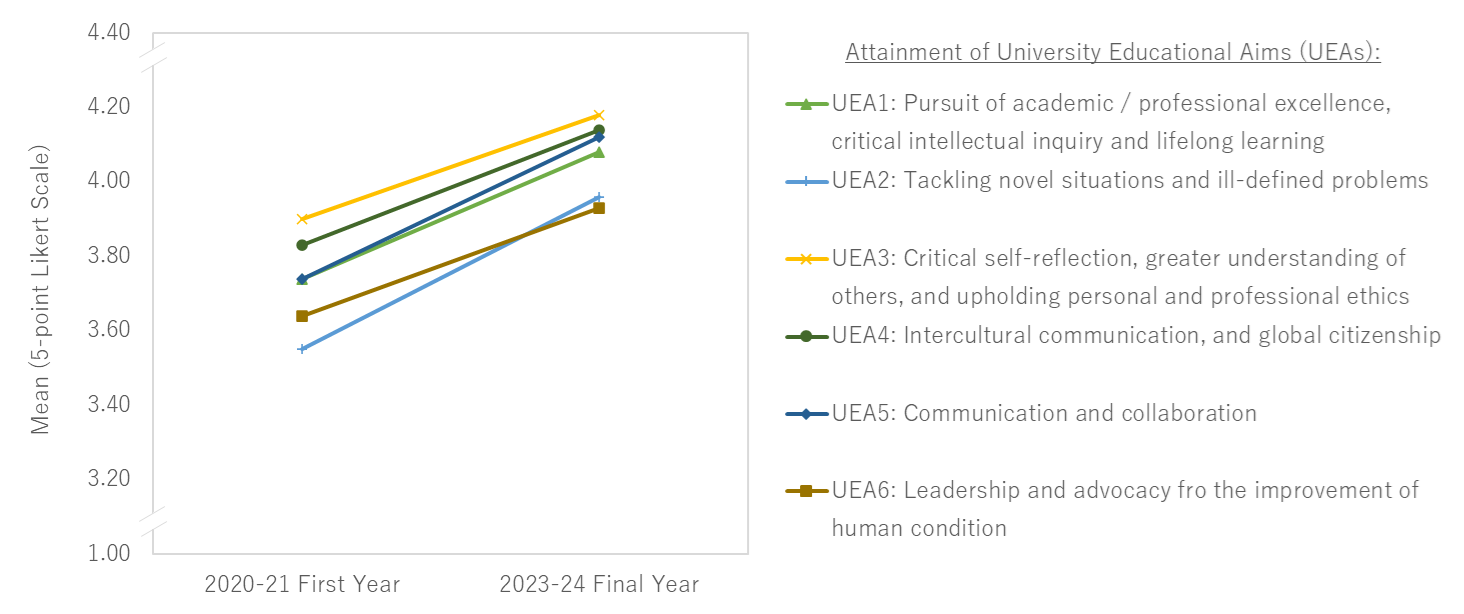
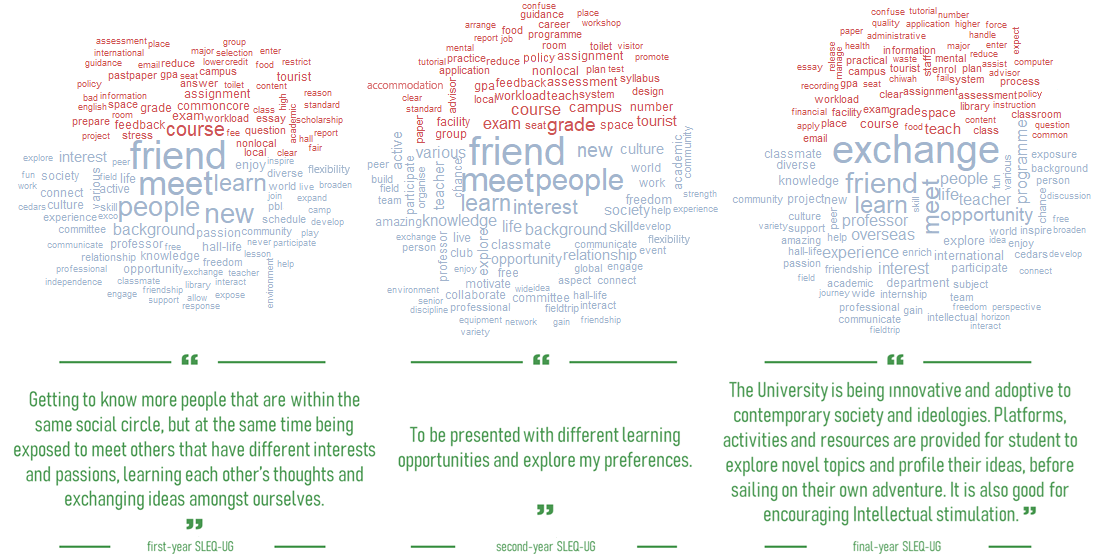
2022-23
Highlights
- Upward trajectories were displayed in all first, second, and final year student perceptions of Attainment of University Educational Aims, Teaching and Learning Environment, and Overall Satisfaction across years of SLEQ-UG administration (Figure 1).
- Gains in Attainment of University Educational Aims were evident from longitudinal tracking of students who took part in the SLEQ-UG during their first and final years (Figure 2).
- Final-year respondents in the 2022-23 SLEQ-UG rated Innovative Learning Experiences more positively when compared to the 2021-22 SLEQ-UG results.
- Concepts like “culture” and “diverse” were exhibited as newly frequently mentioned words by all three cohorts of UG students. (Figures 3a-3c).

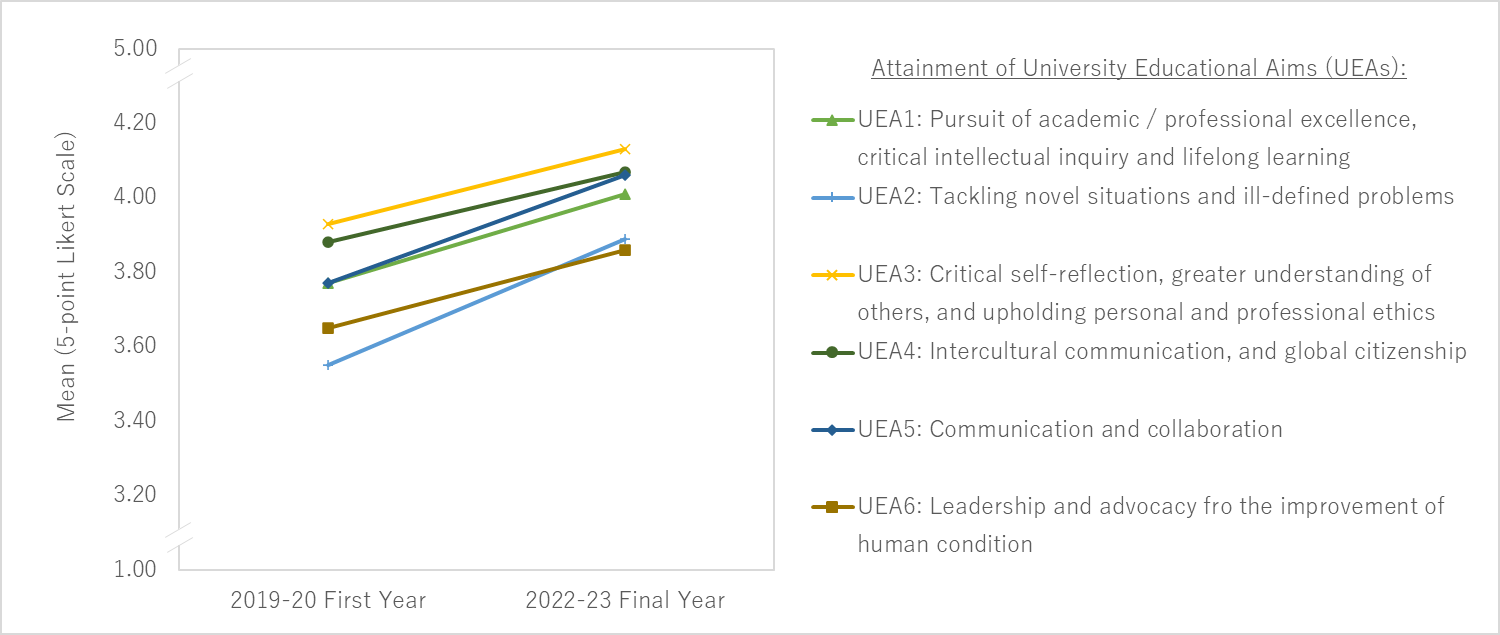
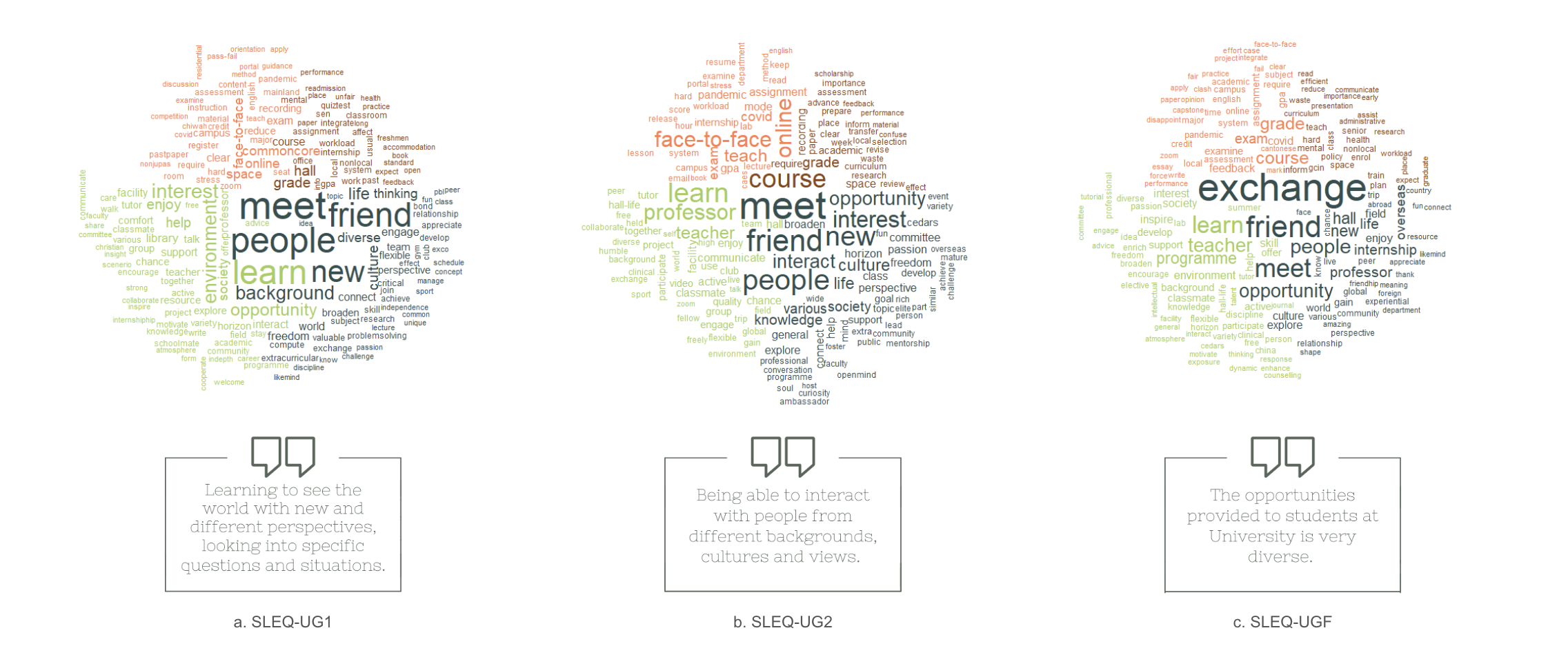
2021-22
Highlights
- Student perceptions of Attainment of University Educational Aims, Teaching and Learning Environment, and Overall Satisfaction have been steadily positive across the years (Figure 1).
- Gains in Attainment of University Educational Aims were evident from longitudinal tracking of students who participated in SLEQ-UG in their first and final years (Figure 2).
- Final-year respondents continued to rate positively on the scales of Internationalisation, Interdisciplinarity, and Innovation with over 75% percent agreement. Frequently mentioned as best aspects of the University experience were “friend”, “learn”, and “opportunity” (Figures 3a-3c).
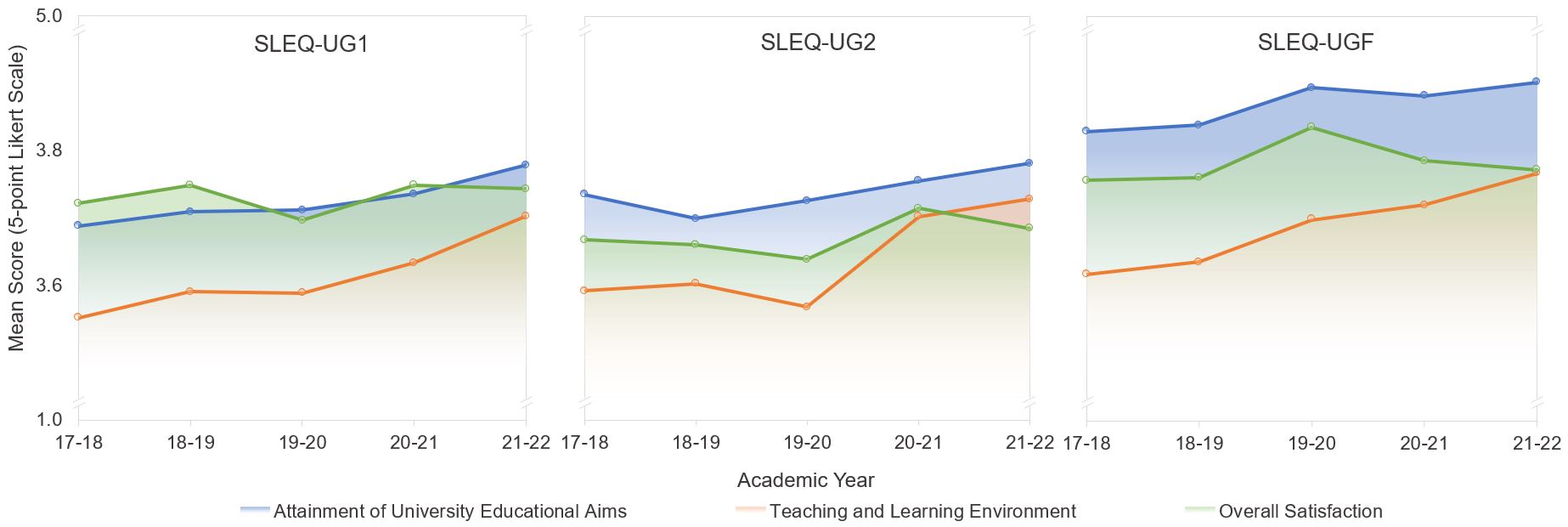
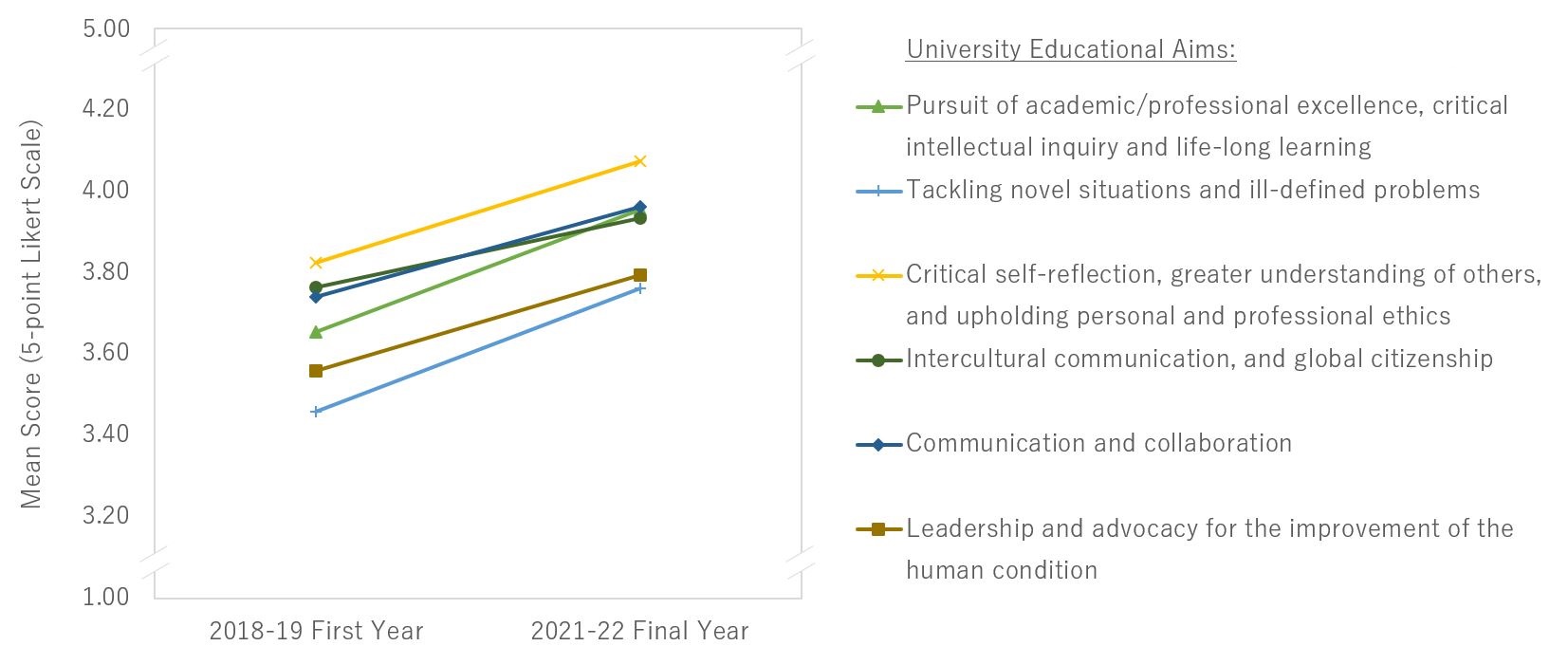
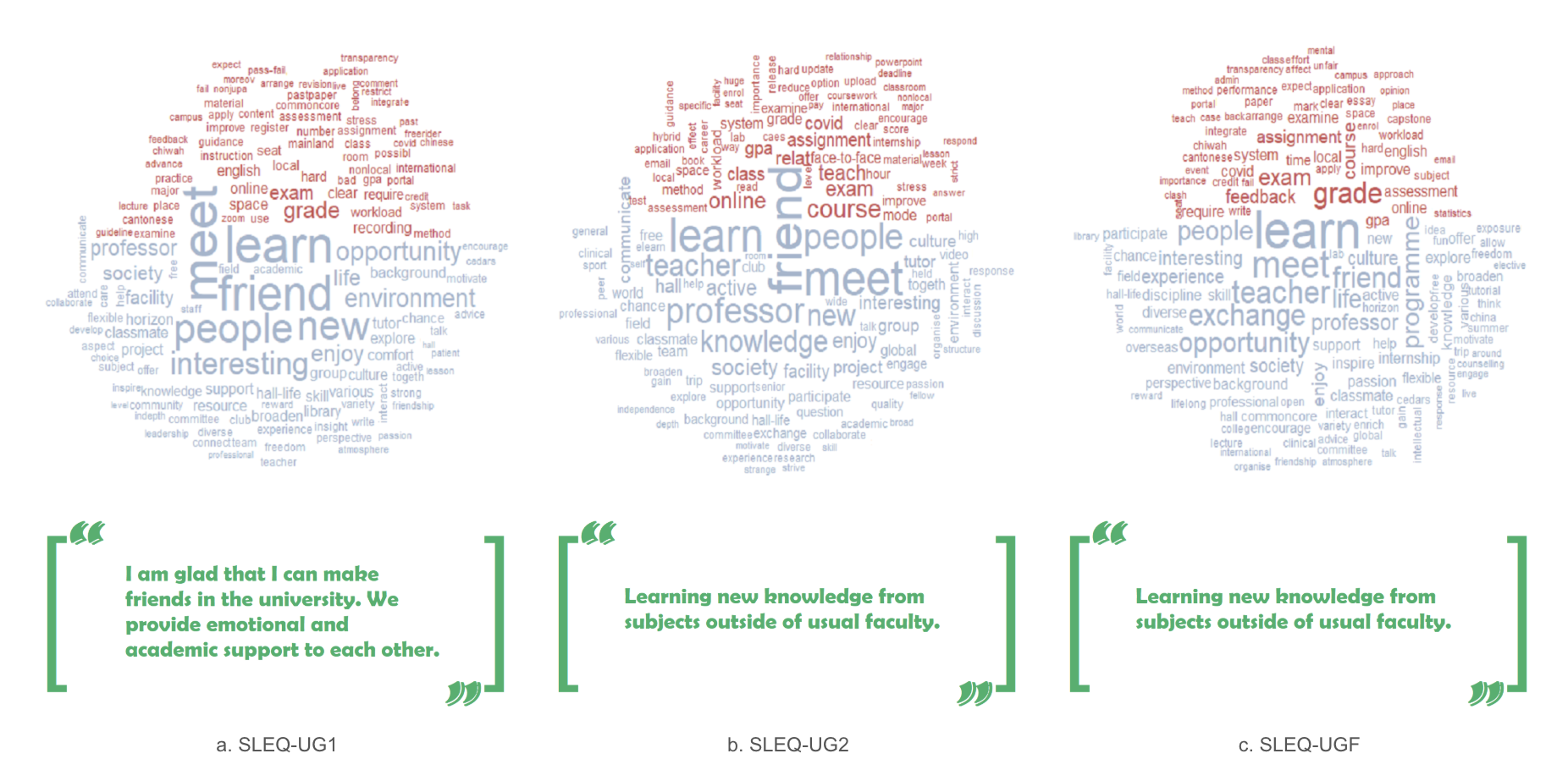
2020-21
Highlights
- The overall profiles of Achievement of Educational Aims, Teaching and Learning Environment, and Overall Satisfaction continued to demonstrate a largely upward trend over the years (Figure 1).
- An upward trajectory on students’ perceived Achievement of Educational Aims was evident from the longitudinal tracking of students who responded to the SLEQ-UG at first and final years (Figure 2).
- Students’ learning experiences in relation to Internationalisation, Interdisciplinarity, Innovation, and Impact were perceived positively by over 75% of the final-year respondents upon their university studies.
- Based on open-ended comments from students of all years, “knowledge”, “opportunities”, and “professors” emerged as the best aspects of their undergraduate experiences. Particular highlights appeared on “friends” and “resources” from first-year undergraduates, “professors” and “opportunities” from second-year undergraduates, and “opportunities” and “environment” from final-year undergraduates (Figures 3a-3c).
Detailed results at the institutional, Faculty, and curriculum levels are available at the online Institutional Survey Reports System (ISRS), which allows Faculties to generate survey reports at various levels and make comparisons across years. All academic and administrative staff with access rights could directly access the System after logging on to the HKU Portal account (HKU Portal > Self Service > Teaching and Learning > Institutional Survey Reports > View Reports). Detailed instructions on using the System are available in the User Manual, downloadable here.
Faculties are welcome to contact Dr. Maggie Zhao at myzhao@hku.hk for support in interpreting and utilising survey data, and Ms. Yvonne Chan at chanyyw@hku.hk for technical support in using ISRS.
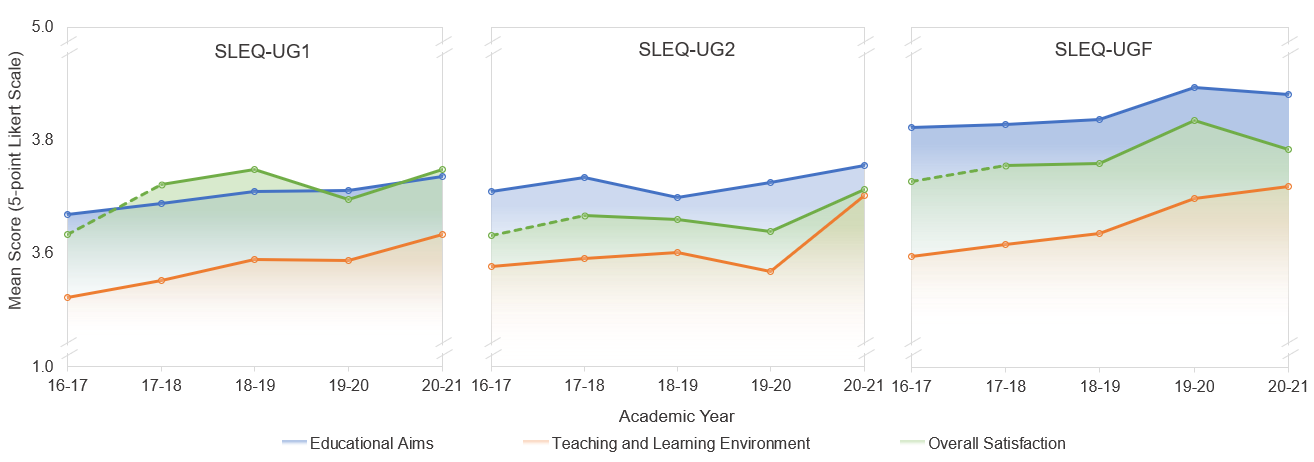
Note. New “Overall Satisfaction” questions were introduced in the 2017-18 SLEQ; therefore, the 2017-18 mean score is not comparable to the means obtained in previous years, as represented in the grey dotted
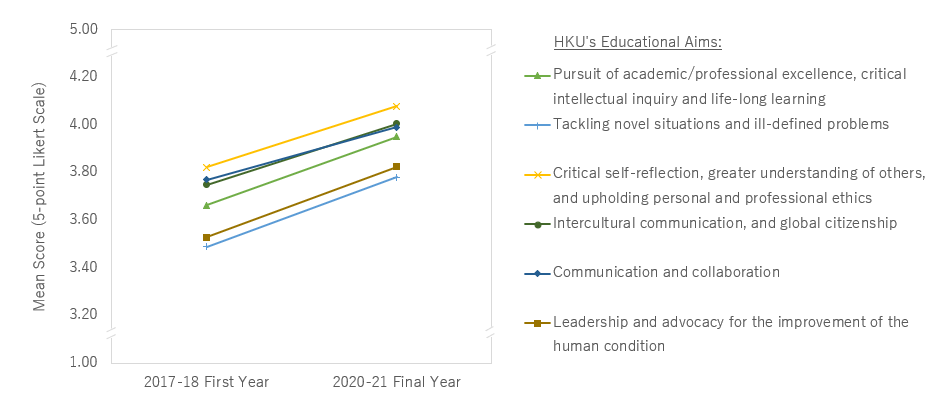
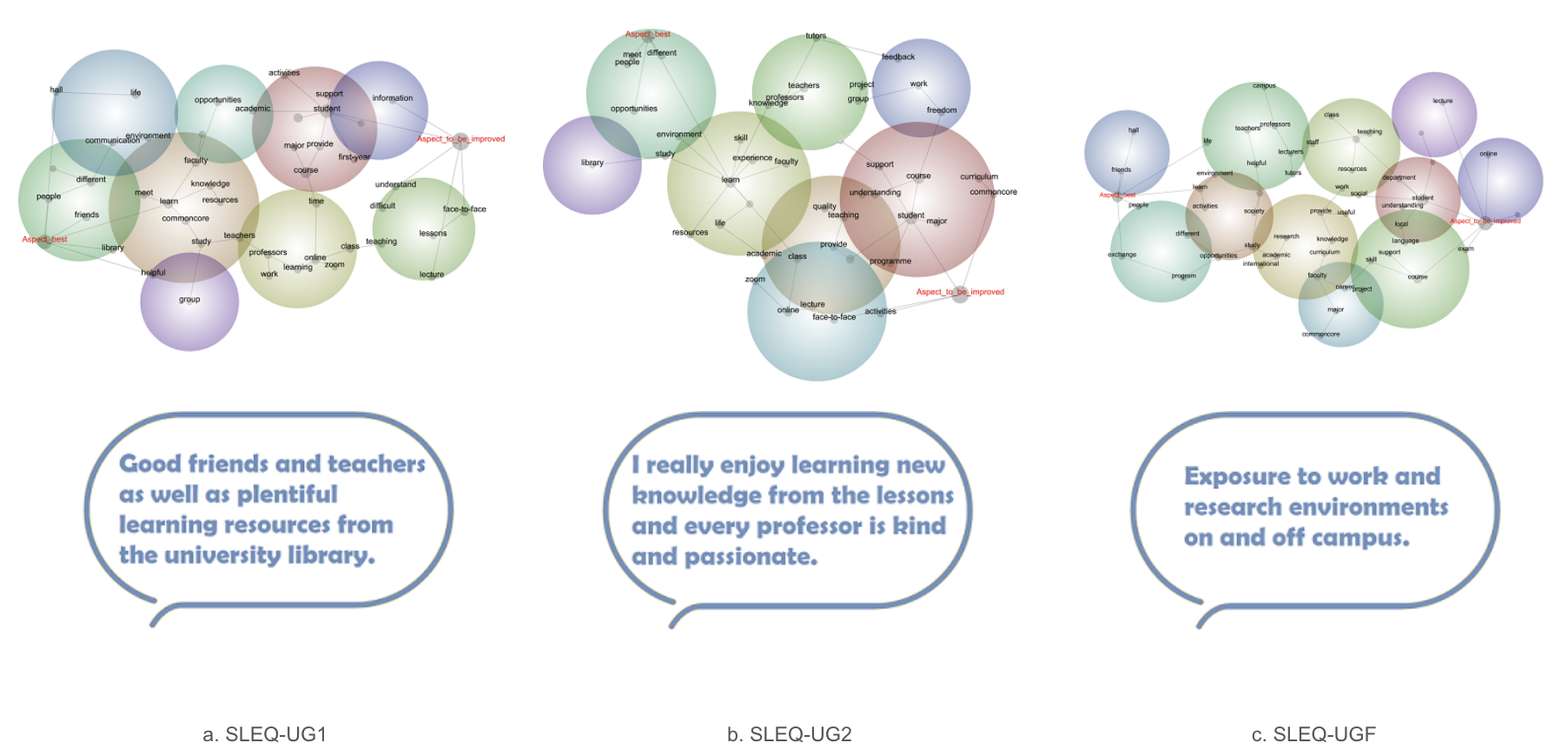
2019-20
Highlights
- Overall performance on Achievement of Educational Aims, Teaching and Learning Environment, and Overall Satisfaction has been largely steady across years, with moderate increases among final-year students (Figure 1).
- In the longitudinal tracking of students reflecting on their learning experiences in the first and final years, there was an upward trajectory in all aspects of perceived attainment of HKU’s Educational Aims (Figure 2).
- Over 75% of final-year respondents had positive perceptions of their learning experiences in relation to Internationalisation, Interdisciplinarity, Innovation, and Impact (the University’s 3+1 Is Strategy) as a result of their university studies.
- In open-ended comments, students of all years frequently mentioned “learn”, “friends”, and “people” as the best aspects of their university experience. First-year students also stressed “life” and “resources”, second-year students highlighted “professors” and “tutors”, and final-year students emphasised “exchange” and “opportunities” (Figure 3).
Detailed results at the institutional, Faculty, and curriculum levels are available at the online Institutional Survey Reports System (ISRS), which allows Faculties to generate survey reports at various levels and make comparisons across years. All academic and administrative staff with access rights could directly access the System after logging on to the HKU Portal account (HKU Portal > Self Service > Teaching and Learning > Institutional Survey Reports > View Reports). Detailed instructions on using the System are available in the User Manual, downloadable here.
Faculties are welcome to contact Dr. Maggie Zhao at myzhao@hku.hk for support in interpreting and utilising survey data, and Ms. Yvonne Chan at chanyyw@hku.hk for technical support in using ISRS.
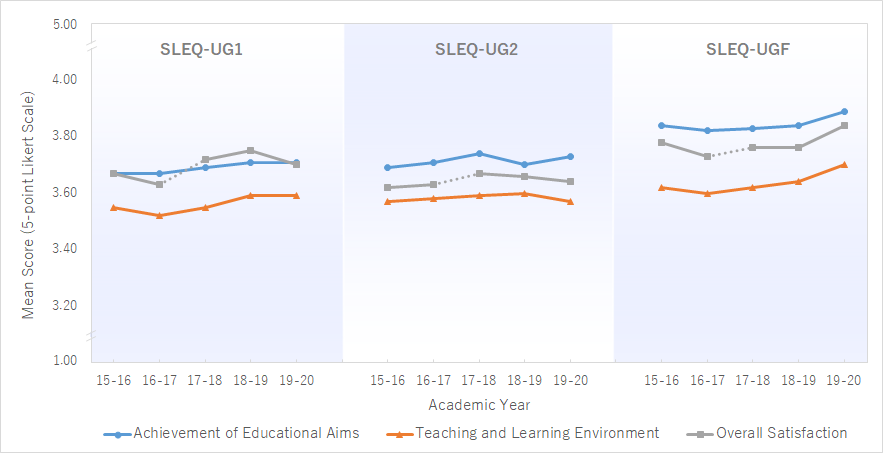
Note. New “Overall Satisfaction” questions were introduced in the 2017-18 SLEQ; therefore, the 2017-18 mean score is not comparable to the means obtained in previous years, as represented in the grey dotted line.
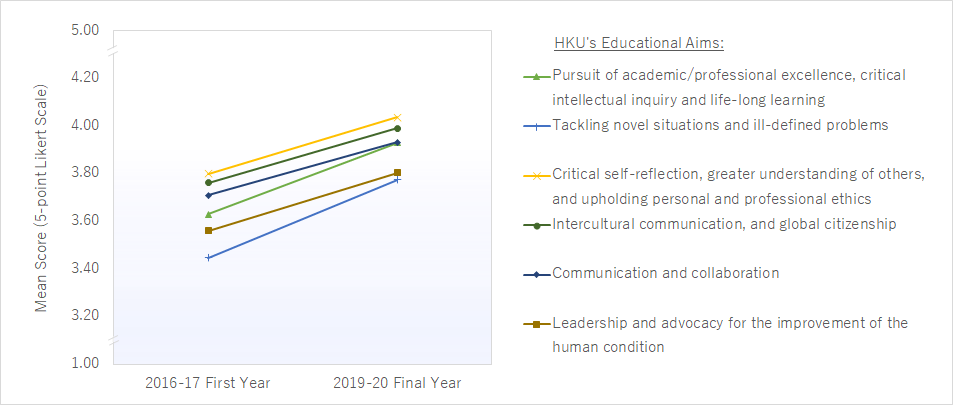
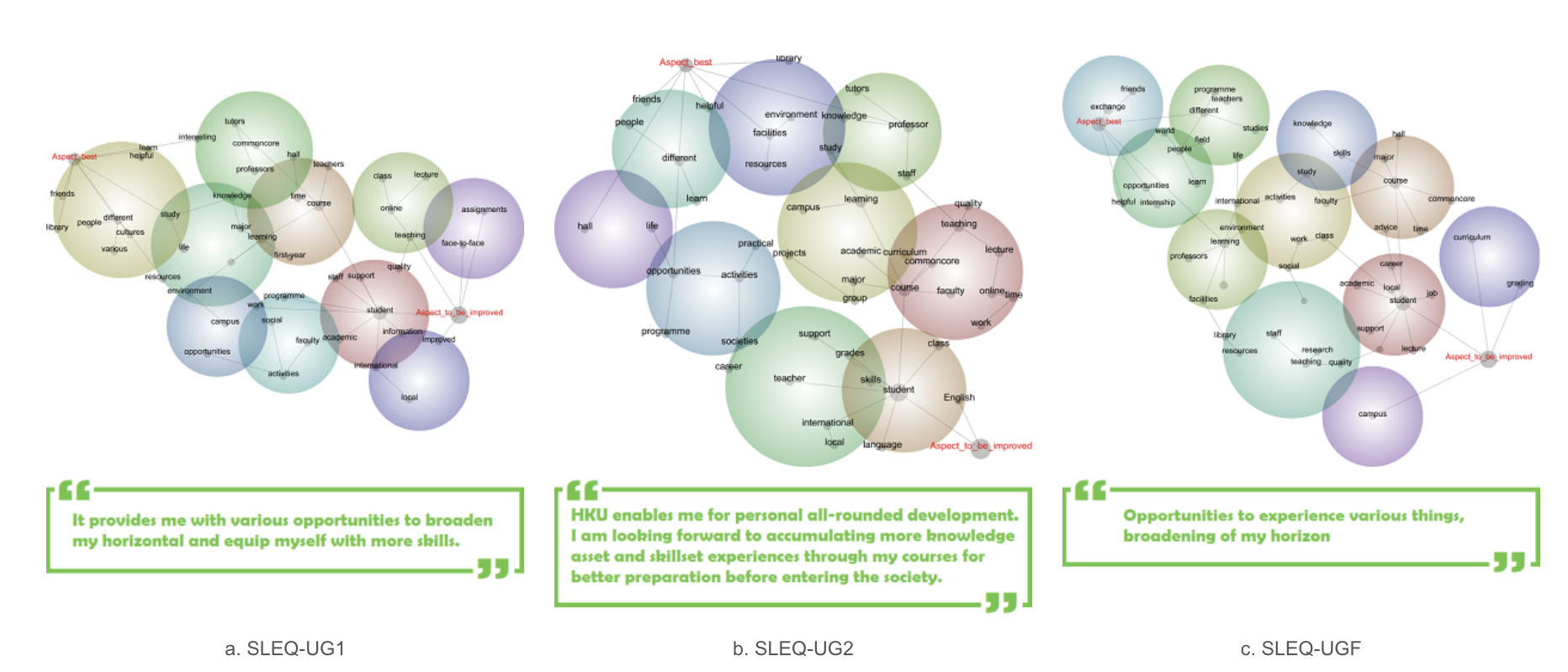
2018-19
Highlights
- Overall performance on Achievement of Educational Aims, Teaching and Learning Environment, and Overall Satisfaction remained steady across years (Figure 1). Similar to previous data, final year students reported the highest scores on all three aspects.
- In the longitudinal tracking on the same cohort of students who completed the SLEQ-UG in their first year and again in their final year, the 2018-19 data reported a consistent trajectory of improvement. Substantial increases were found in students’ attainment of HKU’s Educational Aims (i.e., Critical Intellectual Inquiry, Tackling Novel Situations and Ill-Defined Problems, Intercultural Understanding, Communication, and Upholding Personal and Professional Ethic) (Figure 2).
- Almost 75% of final year respondents responded positively to questions about their overall learning experiences related to Internationalisation, Interdisciplinarity, Innovation, and Impact, the University’s 3+1 Is Strategy.
- Open-ended comments were visualised in comparison word clouds together with selected raw comments to show the keywords and ideas most frequently mentioned by students on “Best Aspects of University Experience” and “Suggestions for Improvement” (Figures 3a-3c). First year students commonly mentioned “friend”, “meet”, and “learn”, second years highlighted “learn”, and final years emphasised “exchange” when reflecting on the best aspects of their university experience.
Detailed results at the institutional, Faculty, and curriculum levels are available at the online Institutional Survey Reports System (ISRS), which allows Faculties to generate survey reports at various levels and make comparisons across years. All academic and administrative staff with access rights could directly access the System after logging on to the HKU Portal account (HKU Portal > Self Service > Teaching and Learning > Institutional Survey Reports > View Reports). Detailed instructions on using the System are available in the User Manual, downloadable here.
Faculties are welcome to contact Dr. Maggie Zhao at myzhao@hku.hk for support in interpreting and utilising survey data, and Ms. Yvonne Chan at chanyyw@hku.hk for technical support in using ISRS.

Note. New “Overall Satisfaction” questions were introduced in the 2017-18 SLEQ; therefore, the 2017-18 mean score is not comparable to the means obtained in previous years, as represented in the grey dotted line.
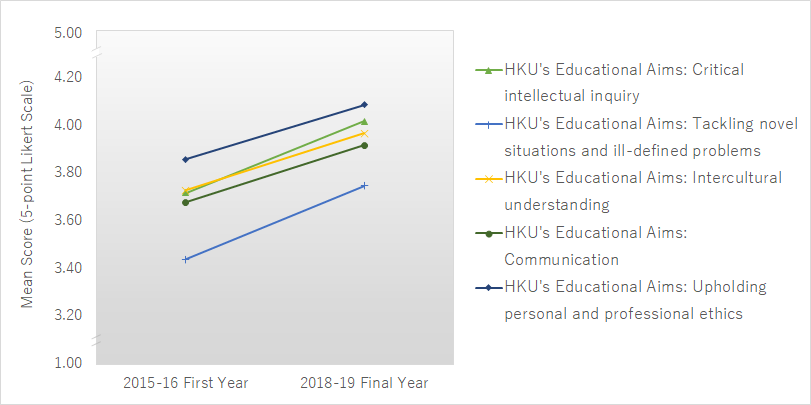
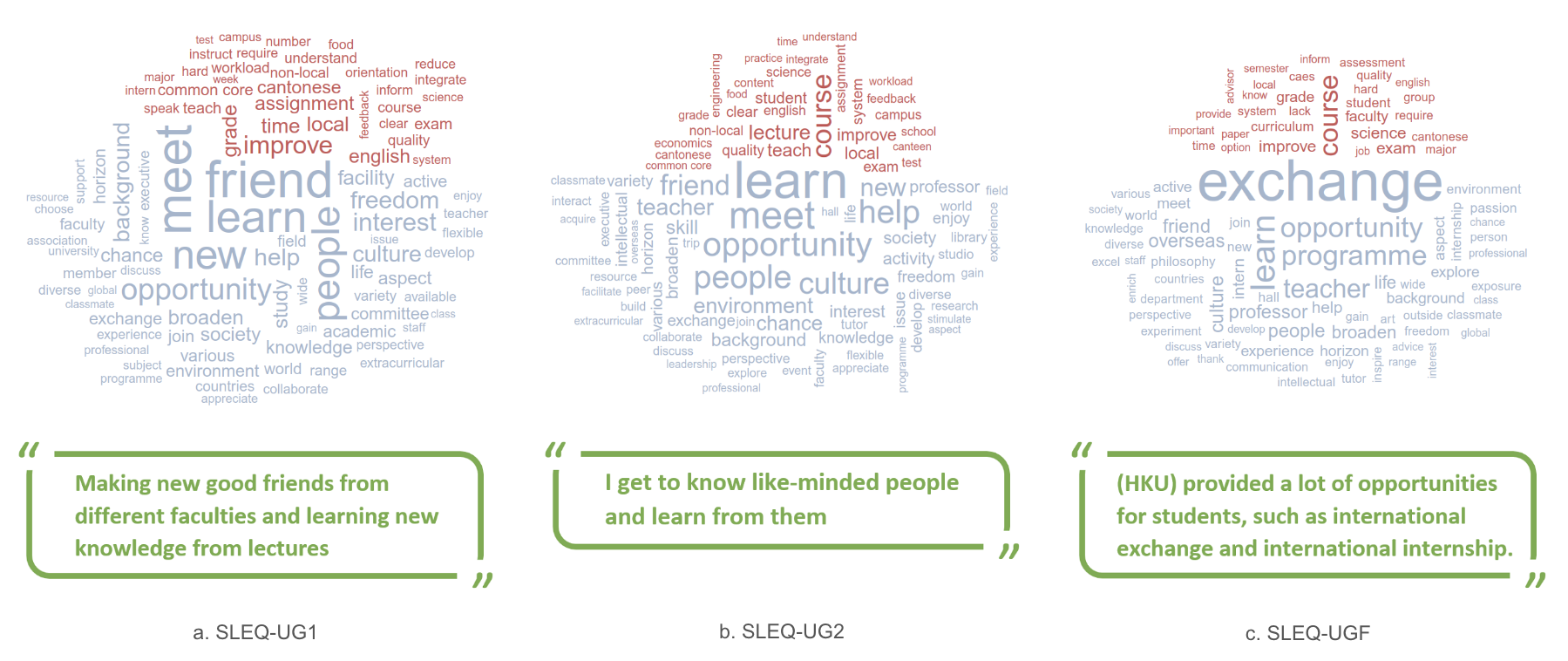
2017-18
Highlights
- Overall performance on Achievement of Educational Aims, Teaching and Learning Environment, and Overall Satisfaction remained consistent across years (Figure 1). Similar to the 2016-17 data, final year students reported the highest scores on all three aspects.
- The same cohort of students who completed the SLEQ-UG in their first year and again in their final year was tracked. Similar to previous years, the 2017-18 data reported a consistent trajectory of improvement. Substantial increases were seen on students’ attainment of HKU’s Educational Aims (i.e., Critical Intellectual Inquiry, Tackling Novel Situations and Ill-Defined Problems, Critical Self-reflection, Intercultural Understanding, Communication, Upholding Personal and Professional Ethics, Global Citizenship), Using English as a Medium of Learning, Common Core: Cultural (or intercultural) Awareness and Common Core: Global Awareness (Figure 2).
- Nearly 75% of final year respondents agreed or strongly agreed on questions pertaining to their overall learning experiences in relation to Internationalisation, Interdisciplinarity, Innovation and Impact, the University’s 3+1 Is Strategy.
- Open-ended comments were visualised in comparison word clouds to highlight the keywords most frequently used by students on “Best Aspects of University Experience” and “Suggestions for Improvement” (Figures 3a-3c).
Detailed results at the institutional, Faculty and curriculum levels are available at the online Institutional Survey Reports System (ISRS), which enables Faculties to generate survey reports at various levels and make comparisons across years. All academic staff and administrative staff with access rights can directly access the System after logging on to the HKU Portal account (HKU Portal > Self Service > Teaching and Learning > Institutional Survey Reports > View Reports). Detailed instructions on using the System are available in the User Manual, downloadable here.
Faculties are welcome to contact Dr. Maggie Zhao at myzhao@hku.hk for support in interpreting and utilising survey data, and Ms. Yvonne Chan at chanyyw@hku.hk for technical support in using ISRS.
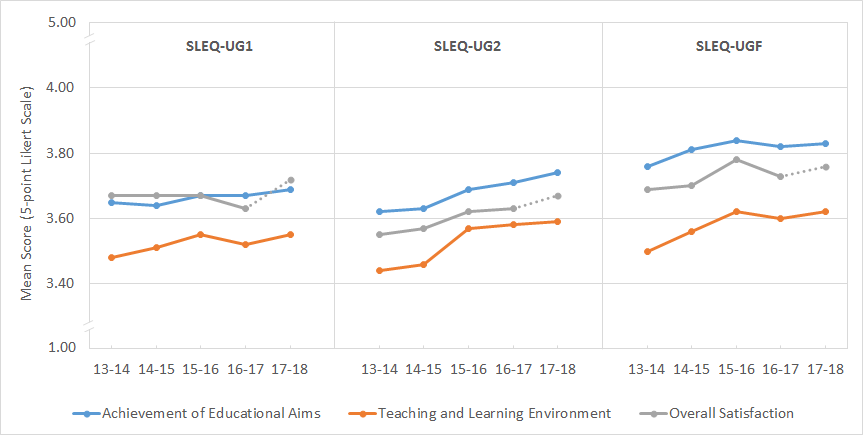
Figure 1. Key Performance Indicators (KPIs) from the SLEQ-UG between 2013-14 and 2017-18
Note. New “Overall Satisfaction” questions were introduced in the 2017-18 SLEQ; therefore, the 2017-18 mean score is not comparable to the means obtained in previous years, as represented in the grey dotted line.
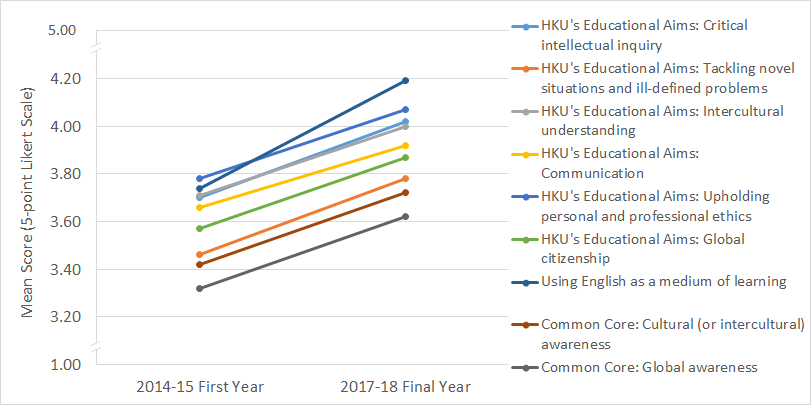
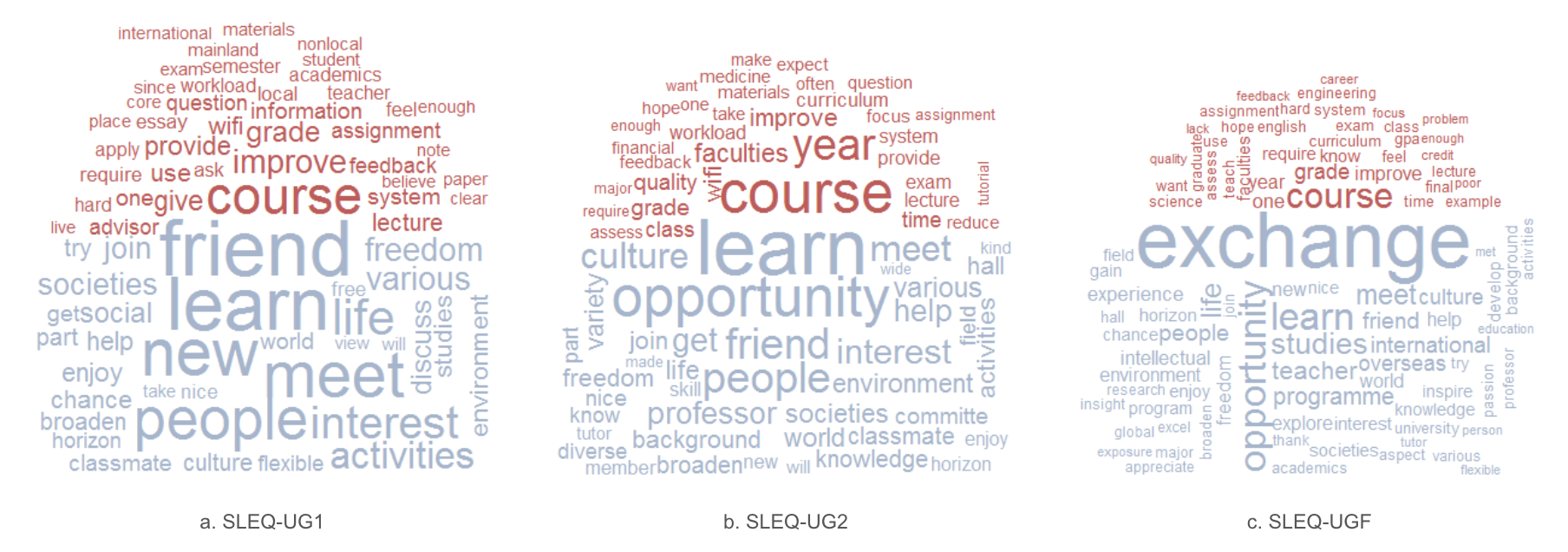
2016-17
Highlights
- Overall performance on Achievement of Educational Aims, Teaching and Learning Environment, and Overall Satisfaction remained steady over the years. In 2016-17, final year students reported the highest scores on these three aspects (Figure 1).
- The same cohort of students who completed the SLEQ-UG in their first year and again in their final year was tracked. The 2016-17 data confirmed a consistent trajectory of improvement. Substantial increases were seen on students’ attainment of HKU’s Educational Aims (i.e., Critical Intellectual Inquiry, Tackling Novel Situations and Ill-Defined Problems, Intercultural Understanding, Upholding Personal and Professional Ethics, Global Citizenship), Using English as a Medium of Learning, and Common Core: Cultural (or intercultural) Awareness (Figure 2).
- More than 70% of the respondents agreed or strongly agreed on questions pertaining to students’ overall learning experiences in relation to Internationalisation, Interdisciplinarity, Innovation and Impact, the University’s 3+1 Is Strategy.
- Open-ended comments were visualised in comparison word clouds to highlight the keywords most frequently used by students on “Best Aspect(s) of University Experience” and “Suggestion(s) for Improvement” (Figures 3a-3c).
Detailed results at the institutional, Faculty and curriculum levels are available at the online Institutional Survey Reports System (ISRS), which enables Faculties to generate survey reports at various levels and make comparisons across years. All academic staff and administrative staff with access rights can directly access the System after logging on to the HKU Portal account (HKU Portal > Self Service > Teaching and Learning > Institutional Survey Reports > View Reports). Detailed instructions on using the System are available in the User Manual, downloadable here.
Faculties are welcome to contact Dr. Maggie Zhao at myzhao@hku.hk for support in interpreting and utilising survey data, and Ms. Yvonne Chan at chanyyw@hku.hk for technical support in using ISRS.
